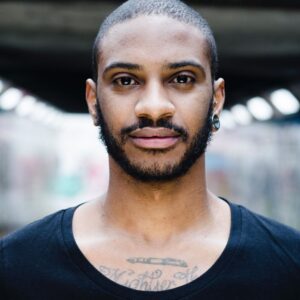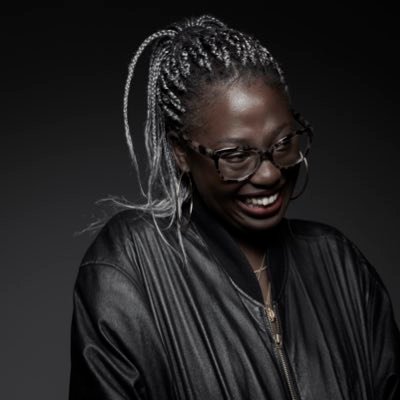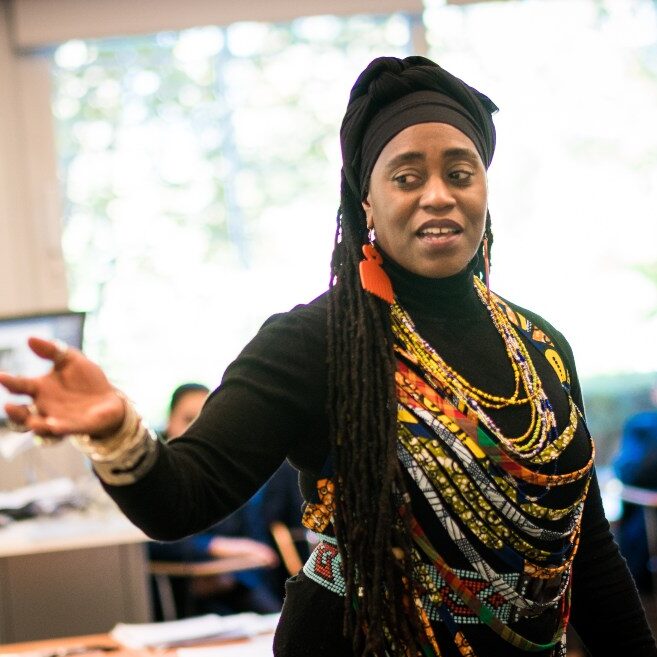In preparation to celebrate Black History Month this October, we recently commissioned three Black writers in our network to produce original creative writing resources exploring key themes, for use by other First Story Writers-in-Residence and by teachers at our partner schools.
Earlier this year, teachers at our partner schools told us how much they would value support to amplify underrepresented voices and experiences in the classroom. In response, over the summer we commissioned three First Story Writers-in-Residence – Khadijah Ibrahiim, Bridget Minamore, and Ashley Hickson-Lovence – to develop new creative writing resources.
At the heart of First Story’s work is our mission to provide a platform for young people to tell their own stories, about their own lives, using their own words. We’ve always been committed to celebrating diverse voices. In the current moment, in particular, we want to empower young Black writers to share their narratives. We also want to encourage writers, teachers and students from all cultures and backgrounds to explore the rich history of Black communities through creative writing activities.
We’re hugely grateful to all three contributors, for the imaginative breadth and richness of their responses. There is so much in the exercises to inspire and provoke. Our hope is that the resources are something writers, schools, and students will turn to again and again, not just during Black History Month, but all year round.
Here we share each of the writers’ forewords, as a taster of what to expect from this exceptional new resource pack.
Ashley Hickson-Lovence

I was raised in a single-parent, working-class inner-city home and it is because of my own background that I am incredibly passionate about inspiring the next generation of young British talent regardless of their ‘credentials’ on paper, or in the eyes of wider society.
In my experience, there is no doubt that being a Black creative is often much harder than it should be when compared with our white counterparts. Recently, I was delighted to be asked to contribute to a Guardian article written by author Nikesh Shukla about the scarcity of Black male authors. It’s clear that more needs to be done to promote the work of writers of colour who are too often pigeonholed, underappreciated or dangerously stereotyped.
This is why First Story is so important; I have first-hand experience witnessing the magic of the workshops as a lead teacher in two different London schools.
Ashley Hickson-Lovence
I am so proud to be a Black British male author, because as I see it, there aren’t enough of us given sufficient attention on the necessary platforms to showcase our work. I am hell-bent in my aims to lower the ladder for the next generation of talented writers – especially those of colour or from marginalised backgrounds – so they too can have their voices heard in the wider realms of the public spectrum. In the current fractious and somewhat uncertain climate, it is now more important than ever to share the stories that matter from young writers who have been forgotten about for too long. I believe it is the job of writers and teachers to facilitate that creative ambition as early as possible.
This is why First Story is so important; I have first-hand experience witnessing the magic of the workshops as a lead teacher in two different London schools. Learning from what I saw, many of the poems in the workshop plans I have created for Black History Month feature the work of writers of colour who have published new poetry recently, so that young people can see that they too can have their words heard no matter their age, race or gender.
Ultimately, in times of strife, our words carry greater weight than ever. Everyone has the right to have their voice heard and to have the opportunity to have their words published; if being a writer is what a young person wants to be, then we must let them know that a writer is what they are as soon as they put pen to paper.
Bridget Minamore

I feel privileged to be a Black writer – specifically, a Black female writer from a working-class background – but more so, I feel privileged to be a Black reader, as well as a Black listener. When I was a young person, I had no idea what a gift it was to grow up immersed in such a rich culture of storytelling. As an adult, professional writer, I am grateful for that foundation every day.
To grow up like I did meant hearing stories and poetry everywhere – in school corridors from older girls telling tales about their love lives, at bus stops from younger boys making fake threats to one another to purposefully scare eavesdroppers, in my living room when my mum shouted into a phone on the kitchen counter, on our balcony when my dad’s friends would chat about stories they heard driving their cabs that day, in the hymns at church, and the echoes of the call to prayer outside.
I always think the key to writing stories and poetry is to discover the stories and poetry you already have in your life.
Bridget Minamore
I always think the key to writing stories and poetry is to discover the stories and poetry you already have in your life. Start writing things down when you find them funny or interesting, and know that your background and heritage – no matter what it is – is an asset to your creative writing.
Being a Black writer has not always been easy; at times I’ve felt like I’ve been spoken down to, at other times, like I’ve not been treated as well as I should or could. A lot of the time my issues have been more personal – whenever the world talks more about race, I’ve struggled with knowing if, when, or how to respond with my words. Do I write a poem immediately? Or do I wait? There is no right answer, but there’s no wrong one, either. The key thing has always been to write when I feel like it’s necessary, and to write when and what I can – that is all the advice I can give to you, too.
Writing has always been a powerful thing for me, especially in the context of Black History Month. For a few years I ran a Twitter account that would share my favourite poems by Black poets every day in October and February (UK and US Black History Months). The account was a reminder to myself that reading words is just as important as writing them, and if you’re finding your writing voice, reading and listening to poems – about Black history or not – is the most important thing you can do.
Khadijah Ibrahiim

As a poet, I am inspired by so many international writers of diverse backgrounds, such as the writings of Wole Soyinka, Louise Bennett, Toni Morrison and Al Tayyab Saleh. There are many other writers who give me joy, who experiment with form and language. I am, however, a lover of history – especially the kinds of narratives that unfold the legacy of lost and hidden African/Caribbean stories alongside Black British poetic narratives. I am drawn to writings that reflect something of me, since I wasn’t taught anything positive about my heritage in school.
The truth is though, that didn’t affect me – I was fortunate that my grandparents were educational activists who understood the reality of the environment I was growing up in. So it was they who introduced me to work by Caribbean artists such as the poems of Louise Bennett and later on, to the likes of Linton Kwesi Johnson and Mikey Smith.
I believe history is living memory, with present and past voices that ought to be heard – your voice is part of that.
Khadijah Ibrahiim
I am now an activist of Black history through creative writing in schools. England, in reality, is a diverse multi-cultural society, where all stories should matter, not just for a season or a month. I guess this is one of the reasons why I wrote Another Crossing – to document stories of the Windrush Generation/community in which I grew up in. I believe my duty is to bring those often-marginalised stories of African Caribbean migration to the forefront, to the attention of the wider community. I believe history is living memory, with present and past voices that ought to be heard – your voice is part of that.
All participating schools will be given access to the full resource. Find out how to become a First Story school here.


 Saint Gabriel’s College ’20:20 Vision’ anthology launch
Saint Gabriel’s College ’20:20 Vision’ anthology launch
